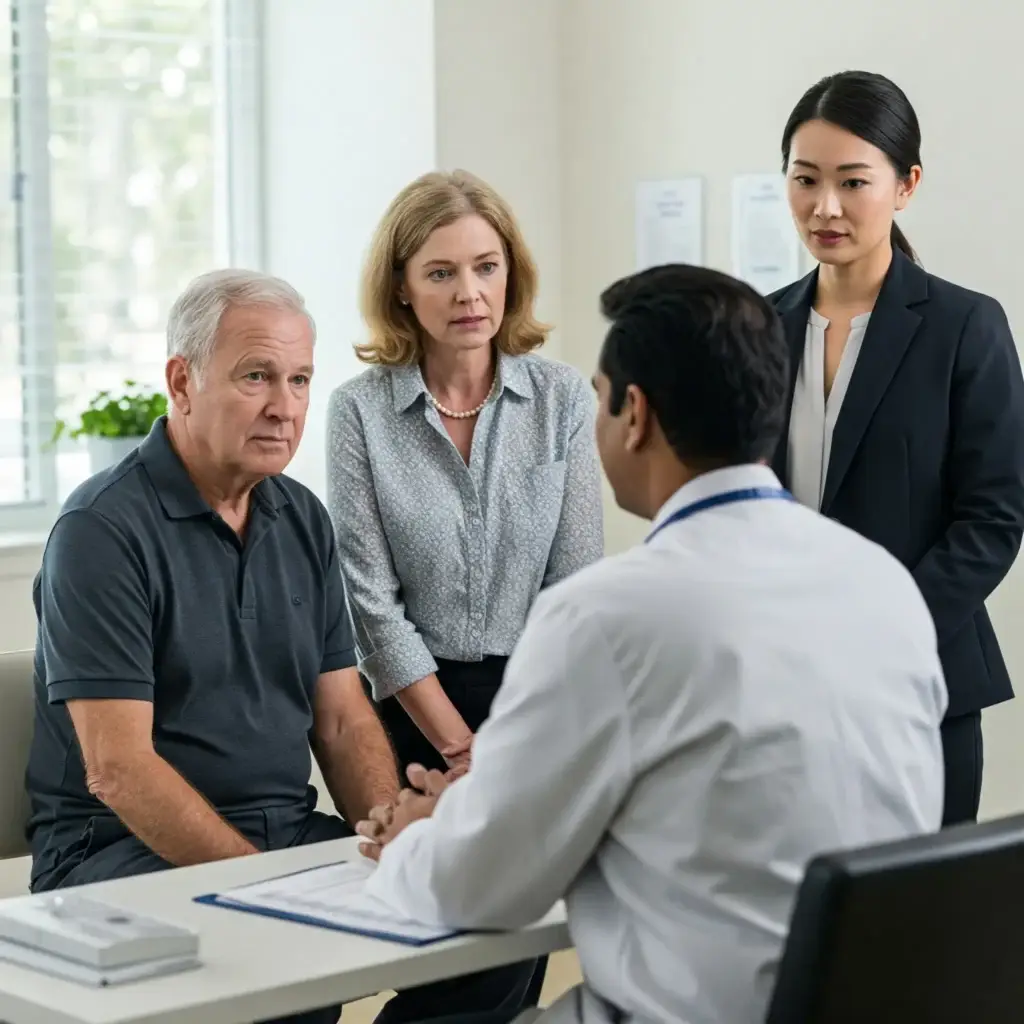Receiving a cancer diagnosis initiates a complex journey often filled with uncertainty. To navigate this path with clarity and confidence, open communication with your oncology team is paramount. Preparing insightful questions empowers you to have an open and honest conversation with your oncologist. To help you strategically prepare for this critical conversation, we have outlined the essential questions to ask your oncologist after receiving a cancer diagnosis. This list of questions will aid in understanding your condition better, exploring treatment options, and preparing for the journey ahead.
What is my prognosis?
Your prognosis is an estimate of the likely course and outcome of your disease. While discussing prognosis requires sensitivity, understanding the likely path can help in making informed decisions about your care and personal affairs. Ask your doctor about the factors that may affect your prognosis, including your overall health, your cancer stage, and how your specific type of cancer responds to treatment.
What are my treatment options?
There are often multiple treatment paths available for cancer patients, each with its benefits and risks. Inquire about all the possible treatment options including surgery, chemotherapy, radiation therapy, targeted therapy, and immunotherapy. Gain a clear understanding of how each option works, the potential side effects, and what the treatment process entails. This will enable you to make an informed choice that aligns with your preferences and lifestyle.
The National Cancer Institute publishes a helpful guide to the different types of cancer treatments.
What is the goal of my treatment?
Different treatments can have varying objectives, such as removing the cancer, controlling its growth, or alleviating symptoms. Ask your oncologist about the primary goal of the recommended treatment for your specific case. Understanding the goals and timeline behind your treatment plan can help set realistic expectations and guide your decisions moving forward.
How will the treatment affect my daily life, work, and family?
Treatments, whether surgical, medical, or radiation, can have varying effects on your energy levels, physical capabilities, and emotional well-being. Discuss with your care team what you can expect in terms of side effects and recovery times. Will you be able to work throughout your treatment? How might it affect your ability to take care of family responsibilities? By addressing these concerns proactively, you can arrange the necessary support and adjust your lifestyle to accommodate these changes.
Are there any dietary restrictions or lifestyle changes I should make during or after treatment?
The role of diet and lifestyle in cancer treatment and recovery is significant, and your healthcare team can provide guidance tailored to your situation and cancer type. Some treatments may require you to avoid certain foods or adopt a special diet to minimize side effects or enhance efficacy. Additionally, maintaining a balanced diet and regular exercise can support your overall health and recovery. Be sure to ask about any specific dietary restrictions or lifestyle changes that are recommended for your treatment plan. Your care team might include a dietitian who can offer detailed nutritional advice and help you create a plan that supports your health goals during and after treatment.
What are my chances of survival?
Cancer survival rates refer to the percentage of people who live for a certain period after being diagnosed with cancer. While this is a delicate question, knowing your survival chances can be an important factor in planning your treatment and future. Discuss survival rates in terms of both short-term and long-term outcomes as these can vary widely depending on factors such as the type of cancer, stage of diagnosis, age of the patient, and access to treatment. It’s important to remember that survival statistics are based on large groups of people and may not accurately predict individual outcomes. Your oncologist can provide a more personalized assessment.
The National Cancer Institute collects and publishes cancer incidence and survival data. It is important to remember that prognosis is very individual, and that statistics are not able to predict an individual’s outcome.
What experience do you have with my type of cancer?
Your oncologist’s experience with your specific type of cancer can influence the quality of care you receive. Ask about the doctor’s background, including board certifications, how many similar cases they have treated, and their success rates. You may also inquire about their involvement in cancer research or clinical trials, as this can indicate their expertise and commitment to staying updated on the latest advancements.
The American Board of Medical Specialties provides information about board certifications, including a tool to determine if your doctor is board certified
Who will be on my care team? Can I keep my regular doctor?
Cancer treatment often involves a multidisciplinary team of healthcare professionals. Ask your oncologist who will be involved in your care, including surgeons, radiation oncologists, nurses, social workers, and dietitians. Knowing the roles of each team member can help you understand who to approach for specific concerns and ensure that your care is comprehensive and coordinated. Rest assured, your primary care doctor remains a key member of your care team and will be able to coordinate with the other members to stay informed of your cancer treatment.
Who is my main point of contact within my care team?
Understanding who your main point of contact is within your care team can streamline communication and improve your overall experience. This is often a specialist nurse or a patient advocate who will coordinate your care. This individual can answer questions, provide updates, and connect you with the appropriate specialists, ensuring a cohesive approach to your treatment.
Should I consider joining a clinical trial?
Clinical trials can provide access to new and potentially effective treatments. Discuss with your oncologist whether there are any clinical trials suitable for your condition. Inquire about the potential benefits and risks involved, as well as what participation would entail. Being part of a clinical trial can contribute to medical research and may offer additional treatment options that are not yet widely available.
The National Library of Medicine publishes resources about clinical trials at ClinicalTrials.gov, which includes resources for finding clinical trials.
What complementary or alternative therapies may be helpful?
Complementary and alternative therapies can often play a role in cancer care by supporting overall well-being. These may include practices such as acupuncture, meditation, or herbal supplements. It’s important to discuss any such therapies with your healthcare team to ensure they are safe and won’t interfere with your conventional cancer treatment. Your medical oncologist can provide guidance on which therapies might be beneficial and align with your treatment plan.
The National Center for Complementary and Integrative Health provides evidence-based information on complementary and alternative medicine.
Can you refer me to a mental health professional to help me cope with the emotional impact of cancer?
The emotional toll of a cancer diagnosis is significant, and mental health support is a vital component of comprehensive cancer care. Many hospitals have psychologists, counselors, or social workers who specialize in supporting cancer patients. These professionals can offer coping strategies, therapy sessions, and support groups to help you manage feelings of anxiety, depression, or stress.
What resources are available for family members and caregivers?
Family members and caregivers are integral to your support system, and their well-being is important too. Many cancer centers offer resources such as educational materials, support groups, and counseling specifically for caregivers. These services can provide them with the knowledge and emotional support needed to care for you effectively while also taking care of their own health and well-being.
Additionally, the American Cancer Society publishes resources for caregivers and family members. Local health systems like NorthShore University HealthSystem’s Kellogg Cancer Center and community organizations like Gilda’s Club Chicago offer support for patients and families navigating cancer.
By preparing a list of questions about cancer, you can engage in a meaningful dialogue with your oncologist. This proactive engagement empowers you with the knowledge needed to make informed decisions and participate actively in your care plan. A cancer journey is undeniably complex, but you don’t have to manage it alone; your healthcare team, and potentially dedicated advocates, are there to provide support and expert guidance every step of the way.
Restore Your Focus, Regain Control
Preparing the right questions is a powerful first step. If you need further support in navigating conversations with your care team, understanding treatment options, or coordinating the complexities of care in the North Shore, Avoa Health is here to help. We invite you to schedule a confidential consultation to learn how our private advocacy services can provide the clarity and peace of mind you deserve
The external links provided in this article are offered as potential resources for further information. Avoa Health includes these links as a convenience and does not imply endorsement of the external site’s content or its sponsoring organization.


